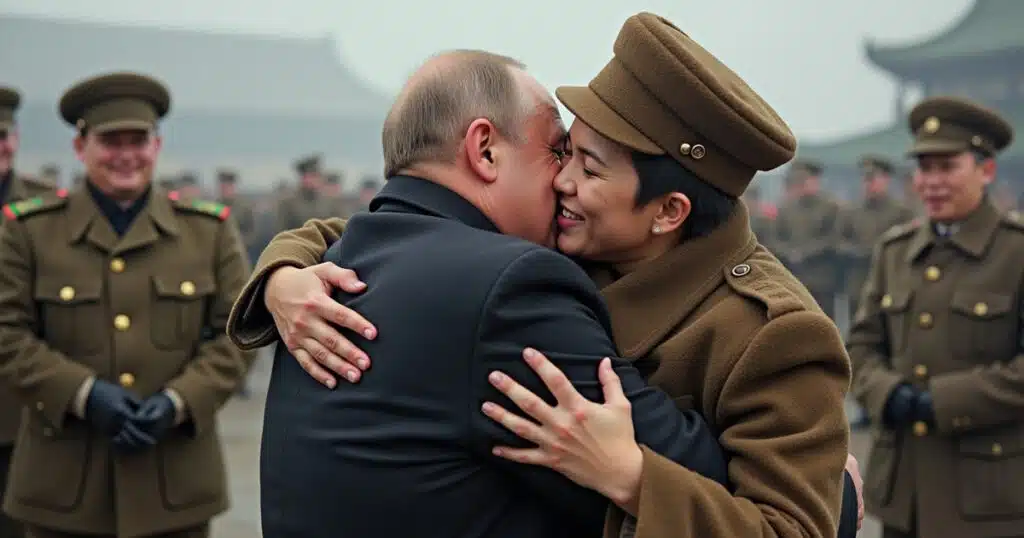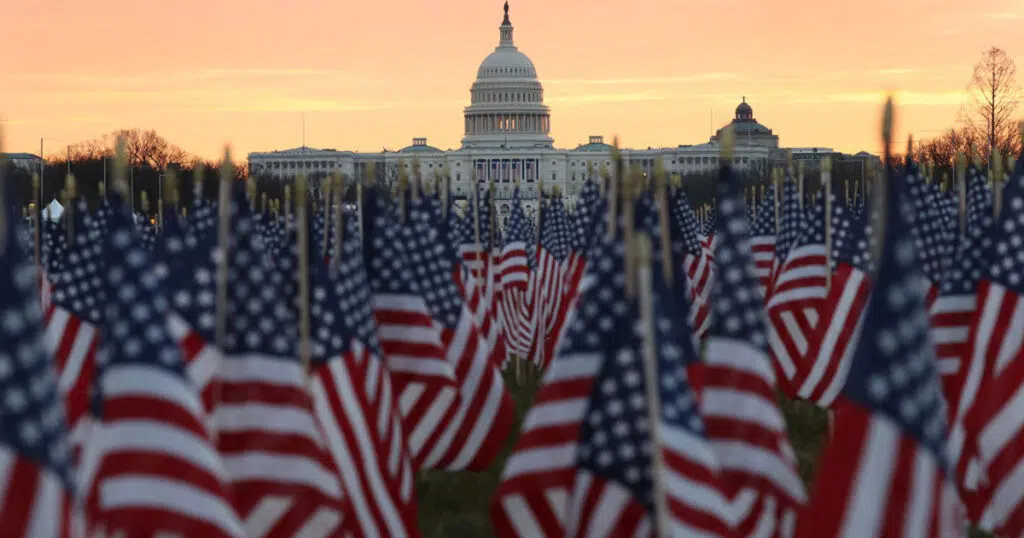
The Russia-North Korea Alliance: A Hidden Opportunity for Washington
As tensions flare in the Middle East, with some calling for the destruction of Iran’s nuclear program, two other American adversaries are signaling that they are increasingly prepared to resort to their nuclear arsenals. Russian President Vladimir Putin revised Moscow’s nuclear doctrine, sanctioning the use of the atomic option in response to an attack supported by a nuclear power. A few days later, North Korea unveiled a uranium enrichment facility, accompanied by weapons equipped to fire long-range missiles.
These developments follow Putin’s declaration that Western long-range weapons firing into Russian territory would constitute an act of war. The past summer saw a series of warm meetings between Putin and North Korean leader Kim Jong Un. In June, the two leaders signed a mutual defense pact that promised military aid to the party embroiled in war. Then, for the first time in 24 years, Putin visited Pyongyang to exchange gifts and positive assurances. Goats, artillery shells, and pledges for further cooperation were traded in August as Russia directed its attention to the Kursk oblast and North Korea attempted to mitigate its food shortages.
Increased rapprochement between these countries has shaken up the geopolitical landscape in Asia. South Korea has predictably been at the center of these convulsions. Despite Seoul’s hesitancy to provide aid to Ukraine after Russia’s invasion, the Moscow-Pyongyang pact led it to reconsider its restrictions on sending lethal weapons to Ukraine, though there is no indication that it has done so yet. More recently, South Korea countered Kim’s growing boldness with its own set of revelations: its most powerful ballistic missile, capable of destroying bunkers in North Korea.
Pyongyang, for its part, has also changed its rhetoric since the pact was signed. A spokesperson for North Korea’s Foreign Ministry described Ukraine’s Kursk incursion as an “extremely grave terrorist crime” orchestrated by Western powers waging a proxy war against Kyiv.
Then, Kim Yo Jong, the deputy director of the Publicity and Information Department, called the West’s decision to support Ukraine an “incredible mistake.” A few days later, in a rebuke to Ukrainian President Volodymyr Zelensky’s recent United Nations address, Kim Yo Jong added that the West is continuing “to play with fire against a nuclear superpower like Russia.” In short, North Korea has never been so vocal about backing Russia.
These developments paint a contrast with Russia’s traditional dual approach to the Korean Peninsula since the collapse of the Soviet Union. At the end of the Cold War, in 1991, Moscow established diplomatic ties with Seoul, which strained Russia’s ties with North Korea.
Seeking economic reform and regional integration, Russia prioritized relations with South Korea by exporting energy resources (oil and gas) and encouraging South Korean companies such as Hyundai, Samsung, and LG to invest in Russia by building factories and joint ventures. In the meantime, Russia substantially cut economic aid to North Korea in the 1990s, which contributed to the starvation experienced in a mid-’90s famine – described internally as the Arduous March – that killed at least 600,000 North Koreans.
Putin initially maintained a balanced approach with both Koreas by resuming limited cooperation with North Korea on some economic and military exchanges without returning to the close ties of the Cold War period. Throughout the early 2000s, Russia participated in multilateral efforts to contain North Korea’s nuclear proliferation, such as the 2003-2009 Six-Party Talks. Furthermore, as a permanent member of the UN Security Council, Russia endorsed international sanctions against Pyongyang in response to North Korean nuclear tests.
The Russian invasion of Ukraine fundamentally shifted Russo-Korean relations in both halves of the peninsula. Since the early phases of the invasion, North Korea has expressed support for the Kremlin and its actions, declaring that the U.S. was “abusing its power” and that NATO expansion and the West’s “hegemonic policy” were the “root cause” of Russia’s war.
North Korea has continuously provided political, economic, and military aid to Moscow, with some estimates suggesting that North Korea may have even provided T-series tank ammunition, anti-tank guided missiles, rocket launchers, and possibly short-range ballistic missiles.
More concretely, both sides have formed a link connecting Pyongyang, Russia’s Far East and the battlefield in Ukraine. Data gathered from the Center for Advanced Defense Studies indicates that between August 2023 and January 2024 Russia shipped over 74,000 metric tons of explosives from two ports in its Far East – ports that receive regular ammunition shipments from North Korea – to 16 locations along the country’s western borders near Ukraine.
However, Russia is not turning to North Korea solely for military aid. Its rapprochement is part of a sweeping diplomatic effort to induce Asian countries to reduce their reliance on the United States and embrace a multipolar world.
Putin’s June visit to Vietnam; his July meeting with Chinese leader Xi Jinping on the sidelines of the Shanghai Cooperation Organization, during which he said that global multipolarity is a “reality now”; and his September consultation with India’s national security advisor have enabled him to shore up support within the international community and multiply his trade partners.
More broadly, the Kremlin is increasingly defining itself as a selfless world power defending the interests of the Global South. Last month, Putin argued that Russia and China are working with this coalition of disadvantaged countries to build a just world order.
During a speech at the September 2024 “Russian Energy Week,” which included representatives from over 50 countries, Putin predicted the rapid growth of the Global South. He spoke of BRICS’s growing economic rise and of Russia’s role in supplying technological, financial, and energy-based assistance to developing countries.
To conclude the United Nations’s 79th General Assembly in New York, Foreign Minister Sergey Lavrov explained that Russia’s initiatives for Eurasian security are “reforming global institutions so that they reflect the real weight of the global majority – the Global South and the east.”
North Korea is a central piece of this Global South strategy. Putin can point to his cooperation with Pyongyang as further proof that he is not afraid of reaching out to countries that have antagonistic relationships with the West. Essentially, Putin is assembling countries that are estranged from the West, whether or not they are currently involved in organizations such as BRICS.
Where that leaves South Korea
In light of the strengthening ties between Russia and North Korea, Seoul, for its part, has the opportunity to properly execute its vision of being a “global pivotal state.” In the same way that Pyongyang’s turn to Moscow demonstrates its willingness to expand its scope beyond the Korean Peninsula and become integrated in the anti-Western axis, South Korea must broaden its regional focus.
It should continue increasing its engagement with NATO through the framework of the Indo-Pacific Four (IP4) and bolstering its trilateral cooperation with the US and Japan to define its role within the Western coalition. Rather than becoming dependent on its partners, as North Korea is on Chinese trade, South Korea should aim to bolster its prosperous semiconductor and automobile industries to provide key technological exports to eager Western countries.
Washington must demonstrate to the South Korean leadership that North Korea and Russia’s rapprochement opens an opportunity for Seoul to broaden its mission. South Korea can play a key role, especially on the technological and industrial front, in reinforcing the United States’ broader interests in the Indo-Pacific and Europe. In exchange for tightened cooperation, Washington can offer security assurances to Seoul in the face of a boldened North Korea.
Will Kielm is a Research Fellow at the Edwin O. Reischauer Center for East Asian Studies at the Johns Hopkins School of Advanced International Studies (SAIS).
Axel de Vernou is a senior at Yale University majoring in Global Affairs and History with a Certificate of Advanced Language Study in Russian. He is a Research Assistant at the Yorktown Institute.
This article was originally published by RealClearDefense and made available via RealClearWire.



